Text
You're trying to find a German Audiobook on Spotify?
You've come to the right place, cause I love looking for them!
Start here :
https://open.spotify.com/playlist/40cICWyKwr3dW30hm1urer?si=-rPCxBE2RU2kP6M-CYVMgw
Perhaps continue here :
https://open.spotify.com/playlist/3xdgnLwG9NJuNi1Cx1Z9yP?si=DkR6bw68SRCkcYQkUHDysA
It's a list of Chapter 1s of German Audiobooks that are professionally recorded and available on Spotify!
I just found this today and immediately wanted to share. Reblog for other German learners!!!
149 notes
·
View notes
Text
The Aestics of Languages, from a girl w/ synesthesia
Norwegian: a clear babbling stream, snowy mountaintops, sea birds, reindeer, sledding down a hill
German: strong black coffe, cobblestone roads, cloudy skies, lustful gazes, red lipstick
Mandarin Chinese: walking down a city street, bustling crowds, stationary, the sound of opening a new book
Spanish: warm summer sun, laughter, bright smiles, dancing until you can’t anymore, gold earrings
Dutch: warm hugs, waffles with cream, good cheese, the smell of an old library
Hindi: marigold flowers, a sense of peace, brilliantly colored vegetables, flowing vibrant clothes
Icelandic: wind rolling over hills, crashing waves, tinkling bells, icicles
French: early morning sunrises, sleeping under a new duvet, strawberries, sharply drawn eyeliner
Italian: home cooked meals, singing alone in your room, boats
Swahili: music that you can’t help but dance to, winning at your favorite game, water dripping into a puddle, golden eyes, dark hair
Arabic: body art, mosaics, glitter, rainbows cast from sunlight through crystal
Japanese: delicate flowers, well made machinery, studying with friends, fireflies, the first snow of winter
Irish: flute music, wet grass, fairy whispers, a full moon, playing with children
Russian: alcohol, runner’s high, bronze statues, old buildings, heartfelt conversations
Feel free to add your own!!
8K notes
·
View notes
Text
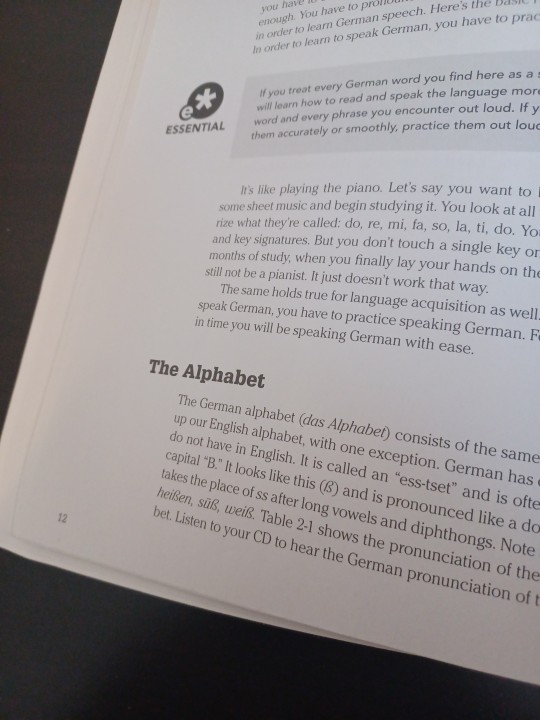
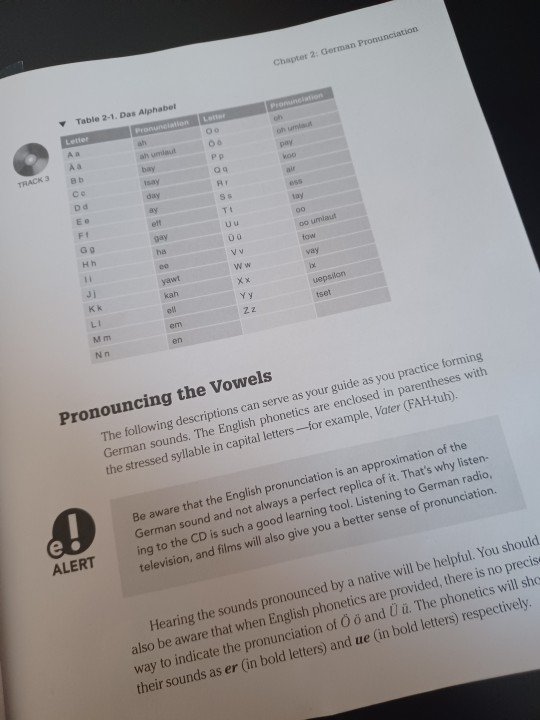

Wednesday May 3 2023
I studied for 1 hour today. Even though I was tired and just wanted to watch youtube. I read the first part of chapter 2 of the Everything Learning German book. And I listened to the CD. Also I just downloaded this really cute app called Habit Rabbit. It's a habit tracker and to do list game. In the app my rabbits name is chocolate chip. :)
#langblr#german langblr#german language#language learning#languageblr#learning languages#study aesthetic#study inspo#studyblr#study blog#studying#study app#study motivation#studyblr community
7 notes
·
View notes
Text

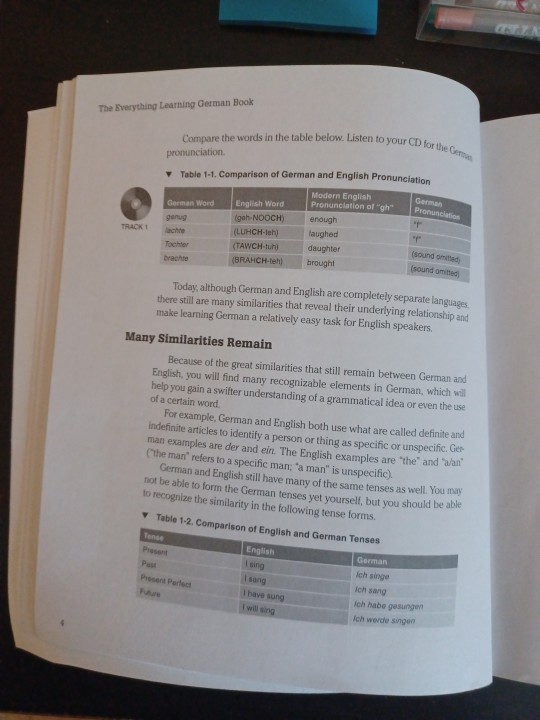
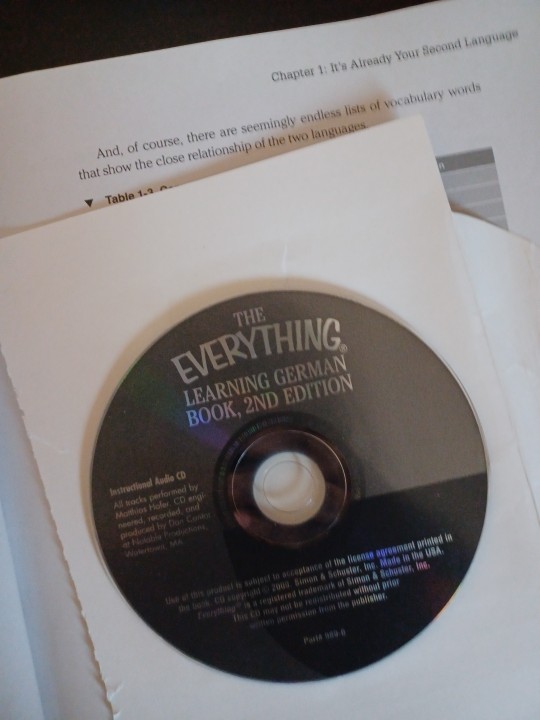

Tuesday May 2 2023
Welcome to my study account. :)
Today I started studying German. I read chapter 1 of the Everything Learning German Book and listened to the CD that came with the book. Then I practiced lesson 1 in the app Mango Languages.
#langblr#german langblr#german language#language learning#languageblr#learning languages#study aesthetic#study inspo#studyblr#new studyblr#study blog#studying
8 notes
·
View notes
Text
Are you looking for German shows and movies to watch online for free?
sounds like a scam or illegal? it is not!
You are looking for the media libraries of the German Publicly Owned Channels! (in German lovingly called "Öffentlich Rechtliche (Sender)")
ARD Mediathek: https://www.ardmediathek.de/
recc: Sendung mit der Maus !!! (a show for kids with both little stories and explaining how the world works, a classic for all german kids, was aired sunday mornings and part of the sunday ritual for many!)
ZDF Mediathek: https://www.zdf.de/
Most shows and movies shown on the public channels are uploaded here (at least temporarily)!
Shows that all Germans know (and many have seen): Sendung mit der Maus (see above), Tatort (our nationally beloved crime show, was trending on Tumblr a while ago!), Tagesschau (THE daily german news show),..
Shows that are market with "UT" in a box are subtitled! (UT= Untertitel = Subtitle)
What to expect of German movies/shows?
TV shows:
- we love crime and hospital shows too (Tatort, In aller Freundschaft (middle aged German's Grey's Anatomy), die Bergretter,...)
- often set in rural areas and often includes a (main)character who's from "the city" and that dissonance is 50% of the humor
Movies:
- focus more on story than crazy action
- the story is often look at these two/three people with completely contradictory personalities bonding over a strange situation
- not seldom in cooperation with neighboring countries (especially France)
- lots of documentaries
Especially keep in mind that while they "try" to be young and hip, the main audience is the middle-aged/older generation
But there's gem's and it's free, well made shows!!
Go ham!!!!
47 notes
·
View notes
Text
Just wanted to let my followers know that I started a studygram account on Instagram. So you can follow me there too now. ^_^
#german langblr#german language#language learning#languageblr#learning languages#langblr#studyblr#study inspo#study aesthetic#studygram#studygrammer
0 notes
Text
How to build a language self-study plan

So I’ve noticed, upon combing through pages and pages of youtube videos and google blogs, that rarely does anyone ever actually tell you what you should be studying. There’s a reason for this ! Everyone is different and at a different level, different motivation. It’s impossible to create a study plan that is perfect for everyone… which is why it can also be agonizing to make one for yourself.
“How am I supposed to know what’s important to study, if I don’t speak the language?”
Well that’s a good question! You need to gauge how far you’ve come so far and how far you’d like to get. It’s easiest when you are starting from zero because you can learn the alphabet, numbers, basic phrases, and basic grammar. Easy peasy. You can go cover to cover in a text book.
Here’s a check-list to create the perfect study plan special to you.
1. What do I know already? What do I need to work on?
- is it worth starting a textbook, if you feel like you already know half of it? It might be worth completing the given exercises and if you achieve an 80% or higher (or you could give that lesson to someone else) then you can move on from that specific point.
- create a list of the points that you still need to master
2. What do I need to include in a study session?
- naturally there needs to be a focus or a few different focuses of a study session, whether it’s a specific activity or a grammar point. I recommend creating a list of things you want to get done (a.) every day, (b) every week, and © every month. These goals must be quantifiable. For example, every week I read two news articles in German. As a reflection, I then write a summary of the event of the article as well as a personal opinion. That’s an easy box to check.
- you need a reflection. It’s important to really take time to reflect on how you feel about the time spent and the materials used. What could you do better next time? What went well?
3. When is the best time to study?
- are you more active/focused in the morning or in the night? The key is consistency. If you have a routine, you’re far more likely to adhere to it. I know that my own schedule is highly changeable and that can make it very difficult, but I’ve found if I wake up in the same period of time every morning, brush my teeth, make my bed, and then sit down to my work, I feel far more productive.
- how much should I study at a time? The recommended period is 25 minutes from the Pomodoro Method with a five minute break. You can research time-management techniques but ultimately it comes down to you.
4. How do I take notes ?
- IT”S ALL ABOUT YOU! What I do is take messy notes in classes or on my own and then I transcribe the finished page to my Notion page. It gives me a chance to make the notes neater and also to review a little bit. I will say though statistically, you will remember better if you write by hand.
- I like to have a column on each page for words I didn’t know
1K notes
·
View notes
Text
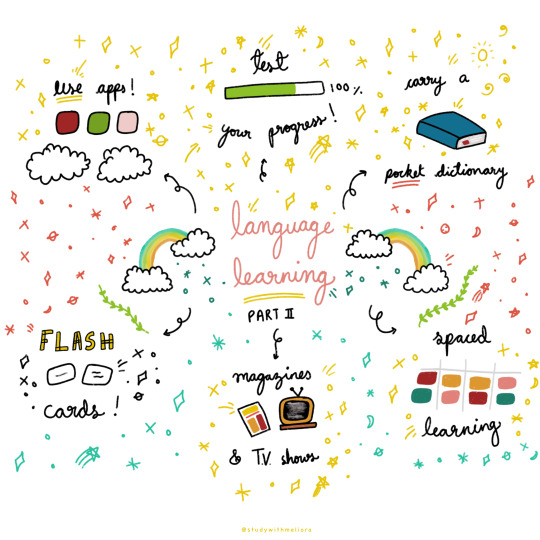
More language tips? Hell yes!
xoxo,
studywithmeliora 💛
40 notes
·
View notes
Text
Bullet Journal for language learners and students
Finally, after months of many tries, I figured out the best method for me to incorporate some useful spread for language learners and students.
Let’s see how I structure an entire month into my bullet journal
Cover: for each month I create a cover that is going to represent the main theme I chose
- disclaimer: the majority of the photos are from my May spreads and theme was “peachy colors”
Monthly log: a classic monthly log structured as a calendar and I added a little goals list in which I write what I want to accomplish during those 30/31 days
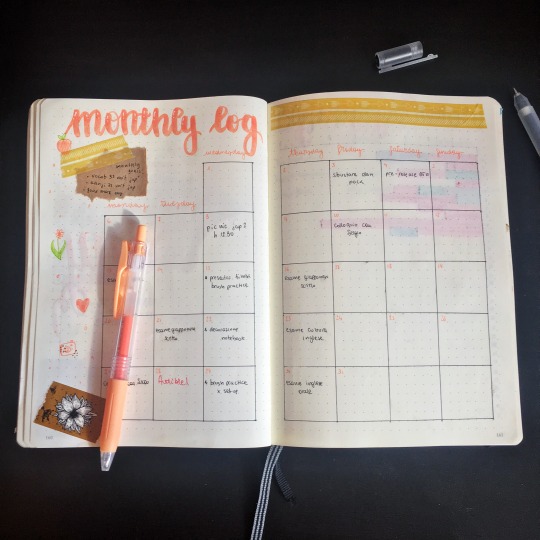
Study Tracker: a monthly tracker in which I write how many hours I studied during that day and I use different colors based on a color coding for the different languages and subjects I study (photo from June’s theme)
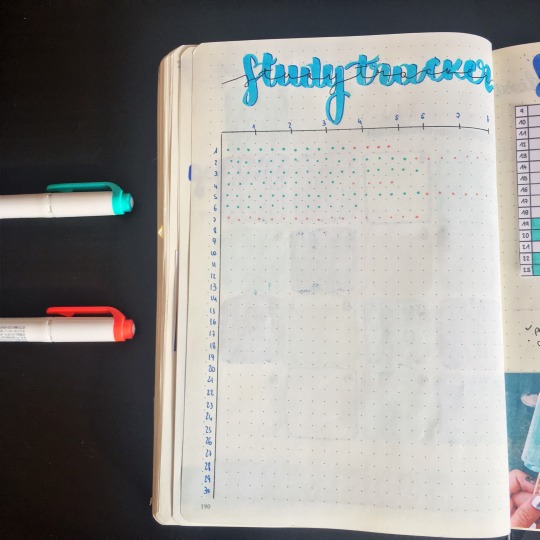
Blog, podcasts, Tumblr blogs, and masterposts log: a list of useful and interesting websites, podcasts, Tumblr blogs and masterposts in which I write the name, the category and languages discussed

Resources log: for each language, I write in the title, what is that resource is about (ex.: grammar, vocab, textbook…) and I rate them after using it for a while
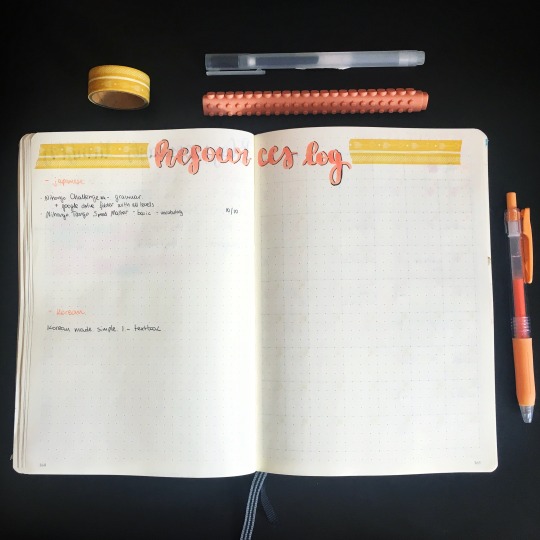
Semester tracker: it is mainly based on my university semester (which is not a full semester idkwhy, but 4 months). This big calendar groups 4 months together and each month has its reference color and in the boxes, I write in exams, deadlines, appointments and stuff like that

Daily logs: this is how my daily logs look like! I created an excel sheet that resembles the 10 minutes method of Korean/Japanese study planners for each day of the month, on one side I write a to-do list for the day, and last but not least I decorate it with different tools such as brush pens, stamps, and washi tapes

Guys this is it! For next month I will use a new bullet journal because this lovely Leucchturm1917 is almost over. So maybe I’ll do an update if something is gonna change!
1K notes
·
View notes
Text


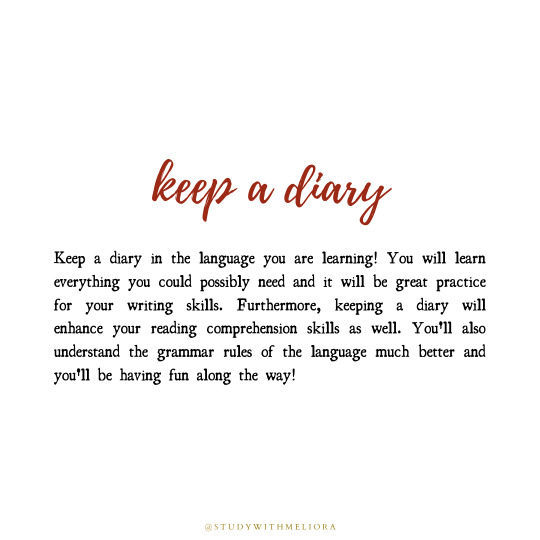

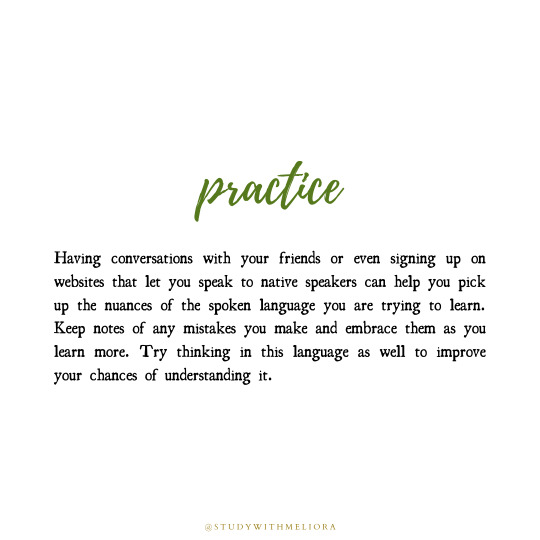
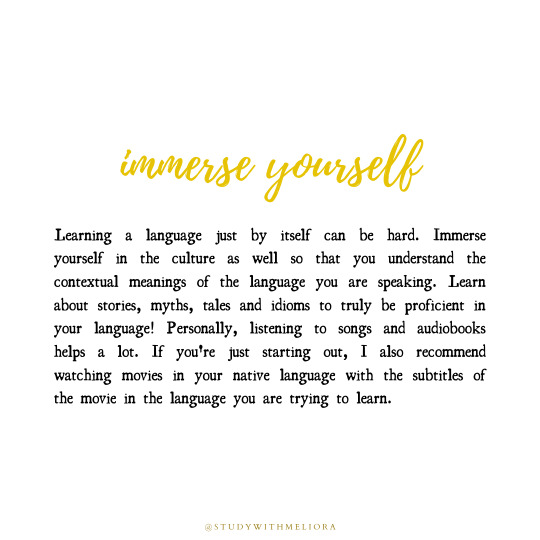
Some language learning tips for you guys! What language are you trying to learn? How many languages do you guys know?
I know four total!💛
xoxo,
studywithmeliora✨
489 notes
·
View notes
Photo
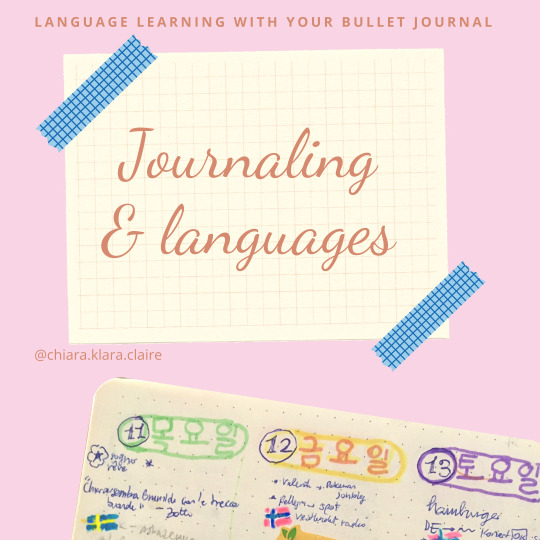
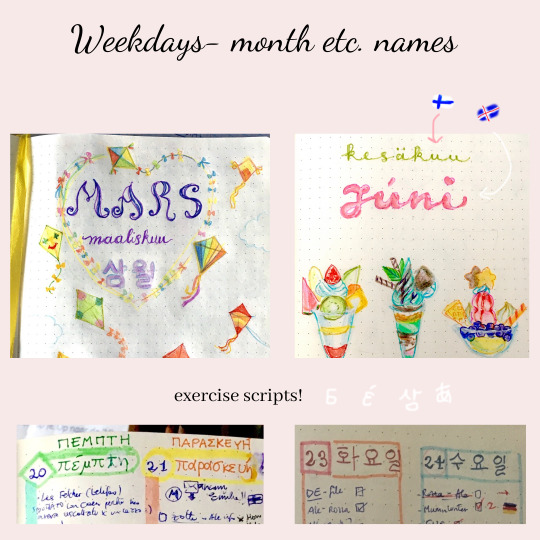
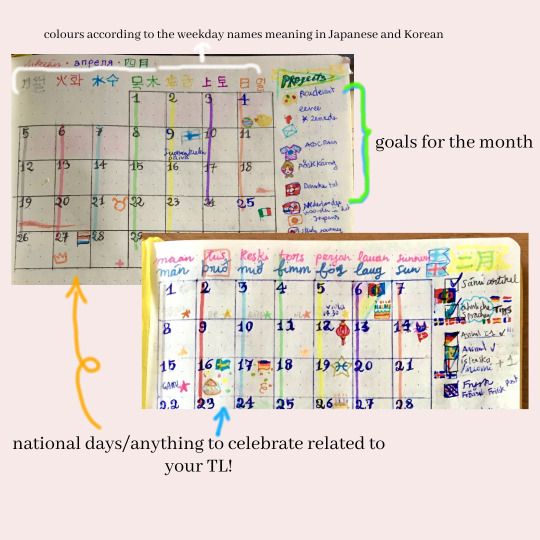
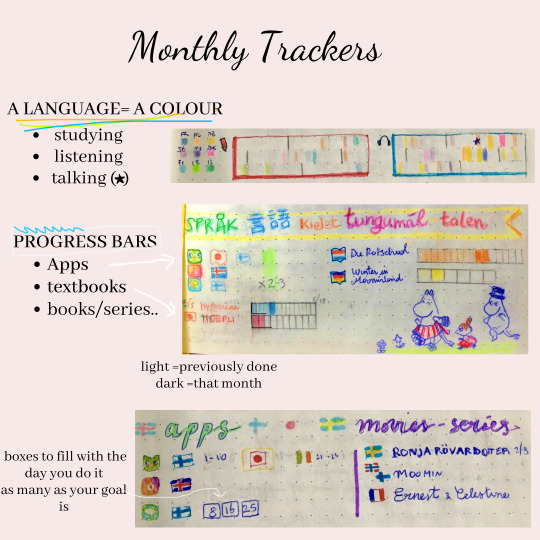
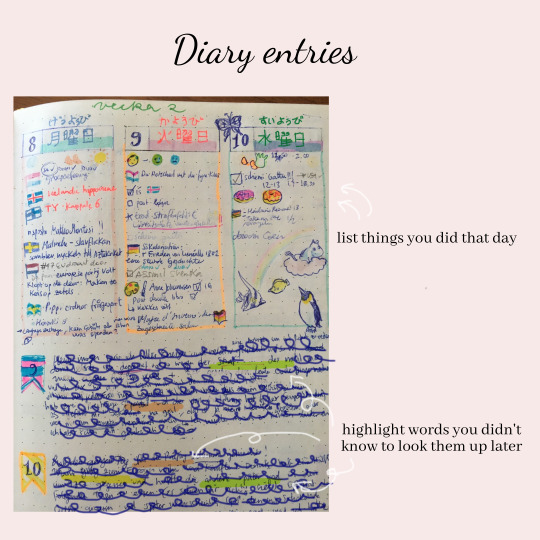
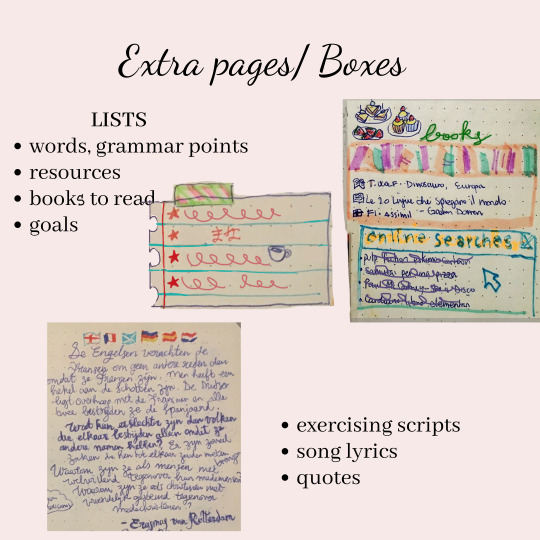
Ideas I developed for my Bullet Journal! My journal is not fully focused on languages but I tried to mix a personal diary with language learning
Hope it inspires you! IG: chiara.klara.claire
225 notes
·
View notes
Text
Language Learning Tip #1
Carry a little pocket vocab notebook around as you go about your day
and anytime you notice that you don’t know a certain word in your target language, make a note of that word in your vocab notebook (like anything to do with your job or cooking ingredients or toiletries, anything at all)
Then when you’re actually sitting down to study your language, take that vocab notebook, look up all the words you wrote down & memorise them (cause these will most likely be the words you’ll encounter & use most often)

215 notes
·
View notes
Text
tips for studying new vocab
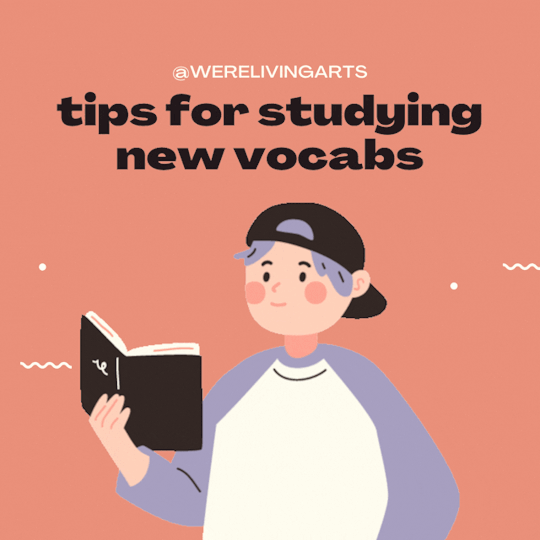
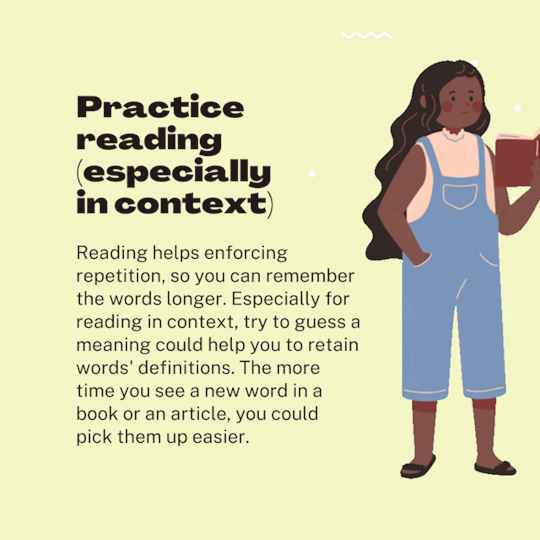
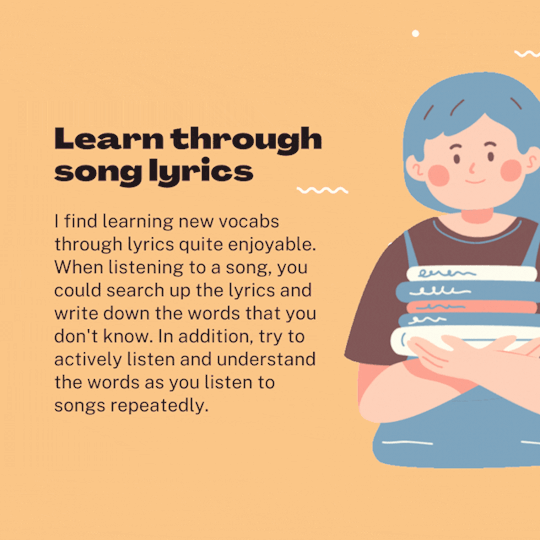
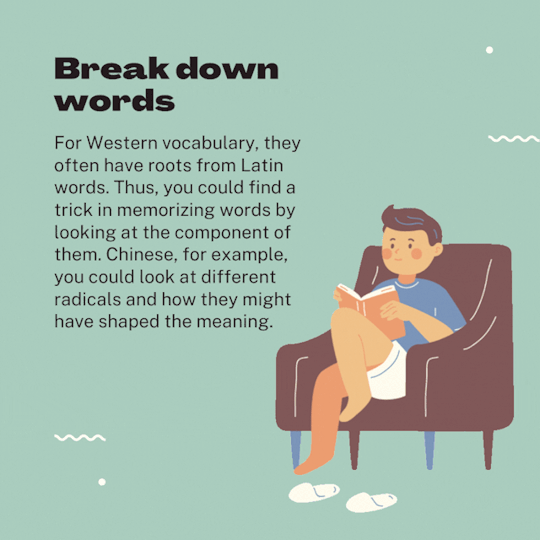
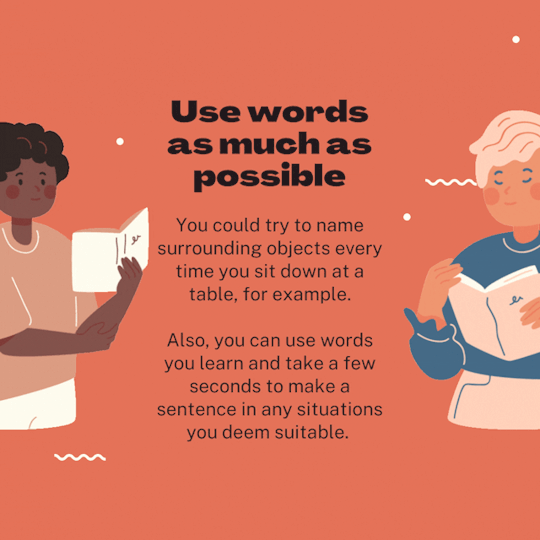
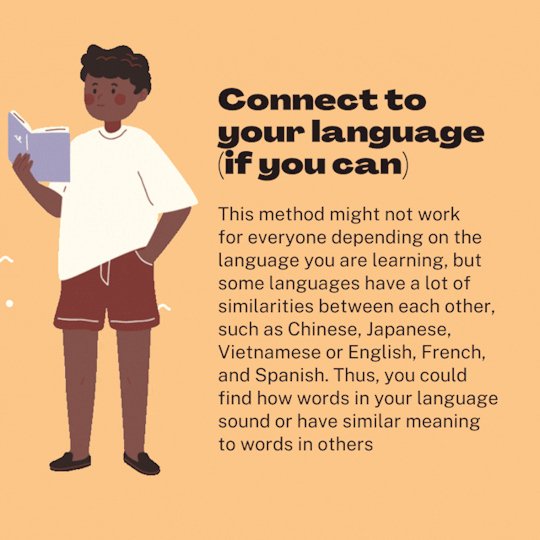
HAPPY NEW YEAR EVERYONE! I’m back with another post relating to studying, but keep in mind that these tips are not one-size-fit-all, so please feel free to implement if you think it will be helpful for you! I personally don’t like forcing myself chunks of words, so I think that learning through music and any activities you like such as watching movies actively would also be really fun!
Please share below if you have any helpful tips too! 💚🎉🤩
1K notes
·
View notes
Text
How I read and enjoy books in my target language
Please note that I write about what works for me and share advice based on my own experiences. If you have a different opinion or if you use other methods, that's absolutely fine. Do whatever works for you.
Since some people asked me how I read books in my target languages, I would like to describe my way of reading in this post. I focus on reading for some time now and I'm very happy with my progress so far. This doesn't mean that I won't change a few things in the future (I'm constantly gaining experience and changing my learning style accordingly).
1. Choosing a book
Before I start reading, I have to choose an appropriate book, obviously. After trial and error I realized how important this step is. My ideal book is:
not too easy (I won't learn much)
not too difficult (if I can't follow at least the rough story I won't enjoy it)
interesting (motivation to read it)
I try to choose a book that is slightly above my level so that I can follow the story without looking up too many words but also learn new words. I don't need to understand everything, but I don't want to feel lost either. Balance is important.
2. Trying the first chapter
After choosing a book that seems to be appropriate, I try to read the first chapter (and sometimes the first two chapters, if they are short). I pay attention to things like:
Can I follow the story?
Is the story interesting?
Do I like the writing style?
If I can answer (most) questions like these with "yes", I continue reading the book.
Do I only understand single words or sentences here and there? Do I have no clue what happens? Then I put the book aside for now and choose an easier one. There's no shame in admitting that this book is too difficult at the moment. Deciding what I don't read is just as important as deciding what I read.
3. Reading
If the level of difficulty is okay, I start reading the book. In my experience, the first few chapters are always the hardest. I need time to get used to the writing style, the used vocabulary and the story.
In the case of the japanese version of Harry Potter, the beginning was difficult because of the writing style. But after two chapters, I began to enjoy the story and so I continued. That's why I always try to read at least the first chapter. A book that seems difficult in the beginning can be very enjoyable once I've read enough pages.
When I come across an interesting word or a sentence I like, I highlight it. I try to not highlight too much stuff, though. Two, maybe three words per page is usually my maximum. Enjoying the story is my number one priority. I can read several pages without highlighting anything, even though there are words I don't know. As long as I don't feel the strong urge to look up a word, I just continue reading.
In many cases I can understand words from context and learn them over time just by seeing them again and again. That's why I don't look up words immediately. I wait to see if they come up more often.

After I finished one chapter, I look up all highlighted words and read the passages that contain these words a second time. This way, I can connect the meaning with the full context. I don't try to memorize the word; I just try to understand it in this particular context before I continue.
Most of the time, I learn words unconsciously. If the book is easy enough, it's not so difficult to guess the meaning of certain words. While reading, I don't focus so much on words I don't know. I just focus on following the story. I may not always understand every detail, but as long as I can follow and enjoy the story, everything is fine. I learn so much by engaging with the language in a meaningful way and enjoying the content. Sometimes, I even forget that I am reading a book in a foreign language!
I have to add, that I'm already familiar with basic sentence patterns and that I have experience with reading books in my target languages. I finished the book "Remembering the Kanji" which makes it easier to guess the meaning of words. Knowing lots of kanji is a great advantage.
I have still a long way to go, of course, but this natural way of learning vocabulary may not work well at very early stages because you need a foundation first. After you are familiar with the dialogues and example sentences in your textbook, graded readers are a good choice in my opinion. Graded readers can make the transition from textbooks to easy books aimed at (young) native speakers easier.
Tip: One thing that helped me is to take a card, write down words I looked up and put this card into the book. When I read it a second time, I don't need to look them up again. Reading texts more than once can help to get more familiar with new words. Plus, writing helps me to remember words better. Reviewing them in their original context is much more enjoyable to me than reviewing them with flashcards. In the picture below you can see how my cards look like:
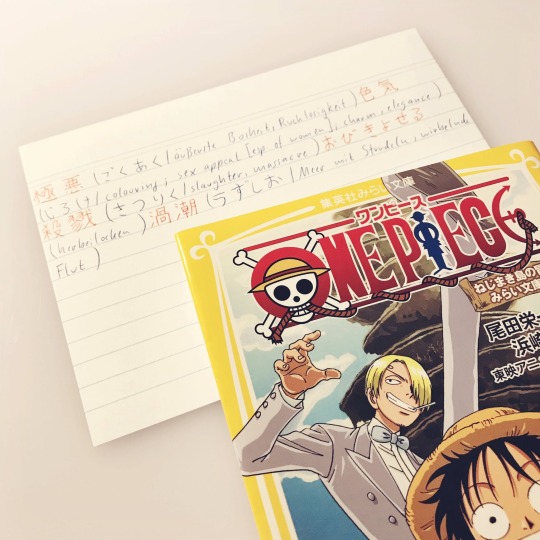
4. Enjoy!
I made enjoying books my number one priority. This is what helped me to make much more progress than before. All I need is enough reading material at the right level and a dictionary. As soon as I get absorbed in a book, I don't think about learning a language. I just want to enjoy the story. The more experience I gain, the better I become at understanding the language as a result. There's no need to force it or to hurry.
What I like about just enjoying a book and learning words naturally is that it's so simple. I don't necessarily need my computer, a certain software, add-ons, ... All I need is something I can read. After reading a chapter, I only look up a few words as I described above and that's it. Then, I often feel so motivated that I want to read more. I read much more than before because I enjoy it so much.
515 notes
·
View notes
Text
how to speak any language fluently
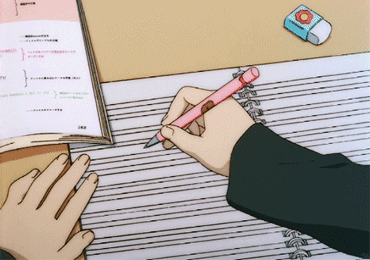
Today I wanted to share with you some tips that you can apply to every language, but I experimented with them all personally to effectively improve my speaking skills in English
slow down:
A common problem among learners can be to speak too quickly. But rushing your words can often lead to confusion and miscommunication, so try to slow down and keep what you say simple
In the beginning, you may sound robotic, but you can speed up with time, once you feel more confident
work on emphasis:
The same sentence, said with different emphasis has very different meanings. Think about the point you want to make and use emphasis where needed to help clarify your meaning
Pro tip: take a sentence from a video or a show you like and repeat it out loud stressing each time a different word of the sentence!
keep going:
If you make a mistake, keep going. Understand that very few people, even native speakers, speak the language flawlessly and we all make mistakes
If you get embarrassed or shy once you’ve made a mistake, this is probably what people will notice, not the mistake itself! So keep going!
practice makes perfect:
There are so many options that now can help you improve your speaking skills without problems!
The best thing is recording voice notes when doing language exchanges, or recording yourself longer notes to receive feedback from other learners or natives on language learning apps!
739 notes
·
View notes
Text
Learning by doing: my approach to self-studying languages
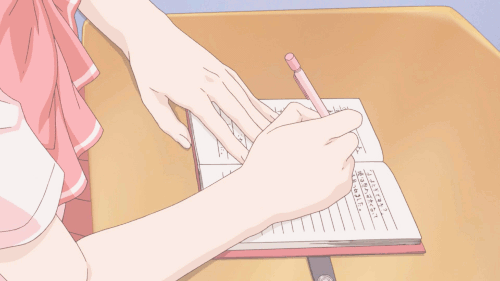
Hi! I have a very short attention span, and I have never really been able to make it through a course or textbook without giving up straight away, so I have never really been able to learn languages in the traditional way. I also very easily get bored with learners material, so I mostly stick to native material to consume my target language. Here is how I do it at the beginner level!
I usually start off with an app to learn the basics of the alphabet, vocabulary and grammar. Most of the times, I use Duolingo. I rarely get past the first few units before I jump into native material. Still, this is a good jumping off point.
When I start with native material, I usually use YouTube videos (with subtitles in the target language), and focus on spoken language, because spoken language is less overwhelming, and involves less complex language and grammar. At this point, I find that books are far too dense and complex for me to handle. Others might enjoy the challenge. My current favourites for this are LingoPie (for French, Spanish, German, Italian and Russian) and Viki (for Korean, Japanese and Mandarin Chinese).
I learn the most important words and phrases as I go. I do NOT look up every word, unless I can understand at least 70% of the language. For this, I will try and write the words and phrases down, and memorise them. I might use a flashcard app too (Anki is my fave, but Quizlet and Memrise are good too). For languages like Japanese and Chinese that have lots of characters to memorise, I will use an app (wanikani and chineasy are my faves). I always make sure that I know how to pronounce and understand each word or phrase.
I will start texting native speakers in my target language on apps like Tandem and HelloTalk. I look up words as I go, and will ocasionally try speaking.
I start shadowing (i.e. repeat after native speakers, imitating the intonation and pronunciation). I use Easy Languages for this.
After a while, I start reading. I’ll usually start with wikihow articles, or fluentu articles in my target language. I’ll write down new words, test myself on them until I get them correct, and then put them into anki to review.
After a while, I’ll formally study some grammar. I’ll usually use a textbook for this. However, I don’t necessarily do it in a traditional way. I go through the entire textbook and make a cheat sheet which condenses all the information in it to a few pages. I’ll review it regularly, and do LOTS of writing practice. For irregular verbs, I’ll just use flashcards, and write them down repeatedly.
Then, I’ll get a speaking buddy (I usually find one on discord) and speak with them a few times a week.
After a while of doing all of this, I start reading fanfiction (usually translations of my faves). It’s difficult, but I try to read intensively (i.e. look up every word).
At this point, I start journaling, and posting on the website journaly.
I’ll listen to podcasts like innovative languages, coffee break languages and language transfer. These are usually good for learning about grammar.
I start intensively reading serious content once I feel like I’m at a confident B1 level. I would suggest using proper newspapers (like le monde for French or BBC for English) and try studying one article daily. After a while, you can start reading a YA book (try something you’ve never read before in any language). Study it chapter by chapter fairly intensively, and then reread it again and again until you understand the story. After you’re finished with a chapter, put the new vocabulary into an app and review fairly regularly.
At the B1 level, listen using two sources: intermediate podcasts and native material. Intermediate podcasts are usually labelled as such, and are IN the target language, but about various topics, like culture or history (innovative languages have some, for french there is inner french, piece of french, news in slow french and RFI:Savoirs, for Spanish there is dreaming Spanish and news in slow spanish, and for Korean there is Iyagi). For native material, continue watching youtube videos about topics that interest you, and consider watching both the news and films/TV shows.
At this point you should be able to construct gramatically correct (mostly - if you still have problems then go through a grammar course, or work through a textbook) and fairly complex texts. I would suggest now learning some essay phrases and writing an essay. You’ll be terrible at first, BELIEVE me, but the more you practice the better you get. You could also start trying to write fanfiction (tip: use full phrases you have found in other books or fanfiction).
Continue doing what you are doing (reading intensively and widely, speaking with your buddy, listening, writing essays and short stories) and I think that after a while you will be able to say you are conversational in another language.
Thanks for reading this post! I hope it was useful! (Also haha ig my break from langblr is over lol).
2K notes
·
View notes
Photo
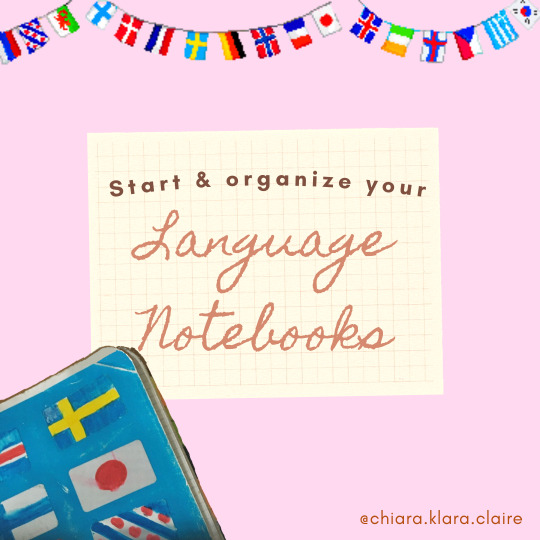
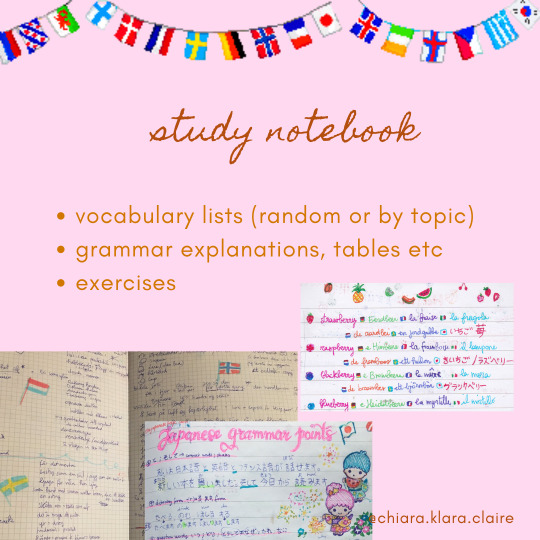

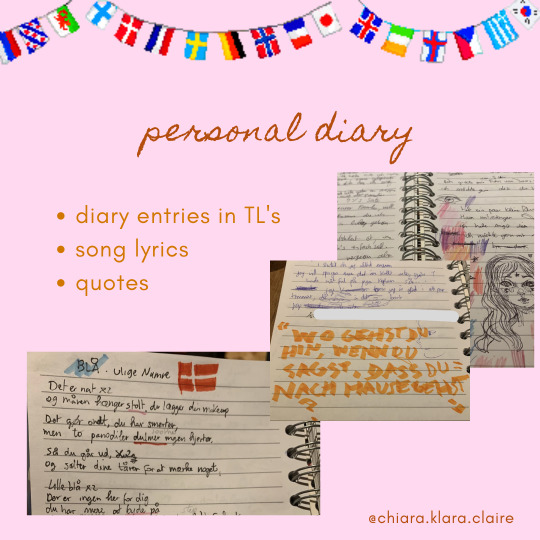
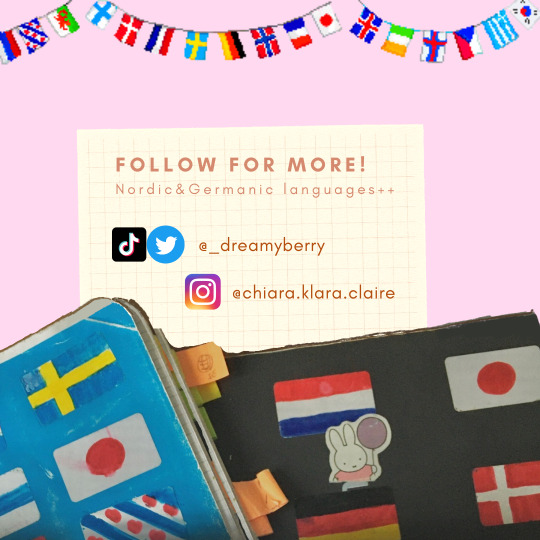
a little guide for those who want to use notebooks for their language journey!
341 notes
·
View notes